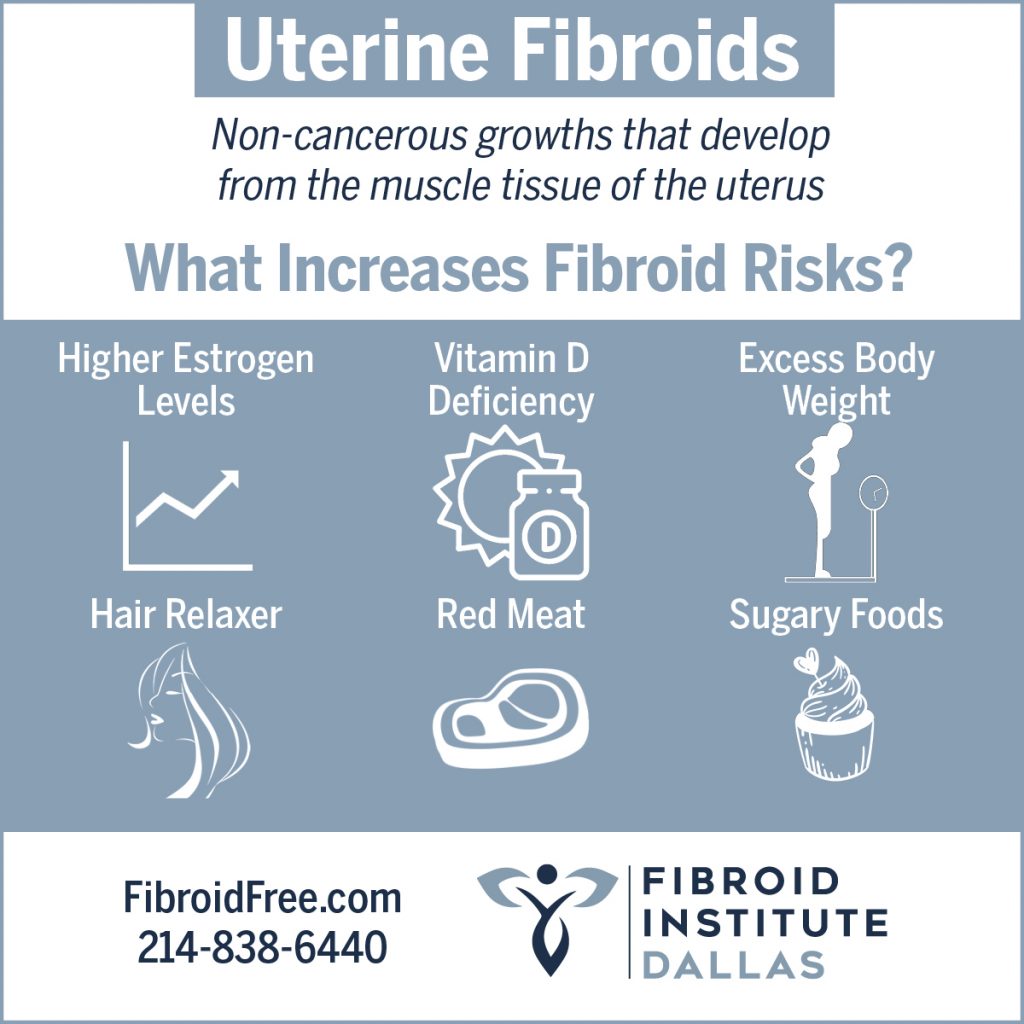At Fibroid Institute Dallas, we are always here to serve our patients with uterine fibroids, many who often come to us armed with lots of questions. A concern frequently asked by women approaching their mid-40s and early 50s is on the relationship between menopause and fibroids. Specifically, they want to know about menopause and fibroids: does menopause affect uterine fibroids? The short answer is yes, but in a good way.
An Overview of Menopause and Fibroids
Fibroids are non-cancerous growths that develop from the muscle tissue of the uterus. Most uterine fibroids are diagnosed in women between the ages of 35 and 54. However, fibroids can occur in women younger than 35. And depending on your situation, you may have one or several. What’s more is that fibroids can be at different locations, differ in size, and either stay that way or grow at different rates.
Fibroid growth is a concern since fibroids can get quite large. But even smaller fibroids, depending on the location, can lead to symptoms such as:
- Periods that last longer than usual
- Pelvic pain or pressure
- Difficulty urinating or needing to urinate more often
- Pain during intercourse
- Back or leg pain
- Heavy menstrual bleeding
- Constipation
Meanwhile, menopause is a natural biological process that marks the end of your menstrual cycles. It’s diagnosed after you’ve gone 12 months without a period and typically occurs between the ages of 45 and 55. While a natural part of life, menopause is not something women look forward to, as symptoms can range anywhere from hot flashes and vaginal dryness to irregular periods and sleep disturbances.
Additional menopausal symptoms include:
- Weight gain
- Mood changes, including depression and anxiety
- Chills and night sweats
Can Menopause Cause Fibroids or Make Them Worse?
In a word—no. In fact, menopause usually has the opposite effect. There is a natural decline in reproductive hormones during this stage of your life. According to the Office on Women’s Health, the hormones estrogen and progesterone stimulate the development of the uterine lining during each menstrual cycle in preparation for pregnancy. This causes fibroids to swell—almost as if your hormones are a critical food source.
Because your body is producing fewer hormones during menopause, this causes your fibroids to shrink and eventually die. Therefore, when it comes to menopause and fibroids, many clinicians believe fibroids shrink when a woman goes through menopause—since this is a period during which hormone levels are lower.

Will My Fibroids Be More Painful After Menopause?
A sudden drop in reproductive hormones—such as what occurs during menopause—can cause fibroids to shrink and prevent new ones from forming. But it’s important to note that menopause and fibroids affect each woman differently, and menopause is not a guaranteed cure for fibroids.
In addition, women taking hormone replacement therapy (HRT) during perimenopause or after menopause may not see symptoms decrease. This is because HRT usually contains a combination of estrogen and progesterone. These are the same hormones allowing fibroids to grow in younger women.
In other words, you could experience uterine fibroid symptoms during and after menopause. If you already have fibroids, and you’re approaching the stages of perimenopause and menopause, leaving your fibroids untreated can impact the uterus long-term, causing unpleasant symptoms of fibroids after menopause.
Post-Menopause and Fibroids Risk Factors
There are specific conditions that can make you more susceptible to fibroids post-menopause, including hypertension (high blood pressure), low Vitamin D levels. Other factors include:
- Obesity — Excessive weight gain, including a diet heavy in red, processed meat, high-fat dairy products, salty foods, and certain carbohydrates cause fibroids to grow. In fact, the risk is two to three times higher in heavy women.
- A family history of fibroids — Studies consistently show that there is a consistent link between fibroids and heredity. So, if your mother, grandmother, or sister had fibroids, you are predisposed. In fact, the national Office on Women’s Health says your risk of also experiencing fibroids is roughly three times higher.
- Ethnicity — African American women are three times more likely to develop fibroids than any other ethnic group. In fact, 80% of Black women will develop fibroids by the time they are 50.
Ways to Reduce Your Risk of Fibroids
- Eat more fruits, especially citrus, and vegetables
- Get more exercise
- Avoid consuming too much alcohol
- Lower your stress levels

Are You A Candidate for Non-Surgical Fibroid Treatment?
At Fibroid Institute Dallas, we are dedicated to treating fibroids and reducing symptoms without surgery using Uterine Fibroid Embolization (UFE). This treatment is unique because it uses diagnostic imaging tools and tiny particles to non-invasively stop blood supply to fibroids, therefore causing them to shrink and die. As a result, you have less pain and a quicker recovery time than fibroid surgery, all while reducing your symptoms.
Advantages of UFE include:
- Procedure typically takes less than an hour
- Tiny wrist puncture, no need for vaginal access
- No blood loss
- All fibroids may be treated at the same time
- Recovery time only 7-10 days versus 4-6 weeks for surgery
- No abdominal (belly) incision
- Over 90% effective
UFE has helped thousands of women significantly reduce or remove their fibroids symptoms.
Free Phone Screening with Fibroid Institute Dallas
Do you have questions about menopause and fibroids, including fibroid removal and what your options are? At Fibroid Institute Dallas, we are dedicated to treating fibroids and helping you live the life you deserve.
With 5-star ratings from her patients, Dr. Suzanne Slonim is the leader in fibroid treatment without surgery. An award-winning fibroid doctor and founder of Fibroid Institute Dallas, Dr. Slonim has performed over 30,000 procedures in 25+ years. She is voted as a top doctor by D Magazine, listed in Super Doctors by Texas Monthly, and honored with the Women in Business Award by the Dallas Business Journal.
It only takes a 10-15 minute free phone screening to see if you are a candidate for UFE. To learn more about the revolutionary, non-surgical, fibroid treatment, Uterine Fibroid Embolization (UFE), call 214-838-6440 or complete the form below.
This information is not a substitute for professional medical advice. Prior to starting any new treatment or if you have questions regarding a medical condition, always seek the advice of your doctor or other qualified health provider.
Fibroid Institute Dallas serves the DFW area including Fort Worth, Grand Prairie, HEB, Arlington, Hutchins, Irving, Duncanville, DeSoto, Cedar Hill, Lancaster, Cockrell Hill, Highland Park, University Park, Park Cities, Garland, Mesquite, Richardson, Dallas, Addison, Carrollton, Plano, Frisco, McKinney, Allen, and all of North Texas.

